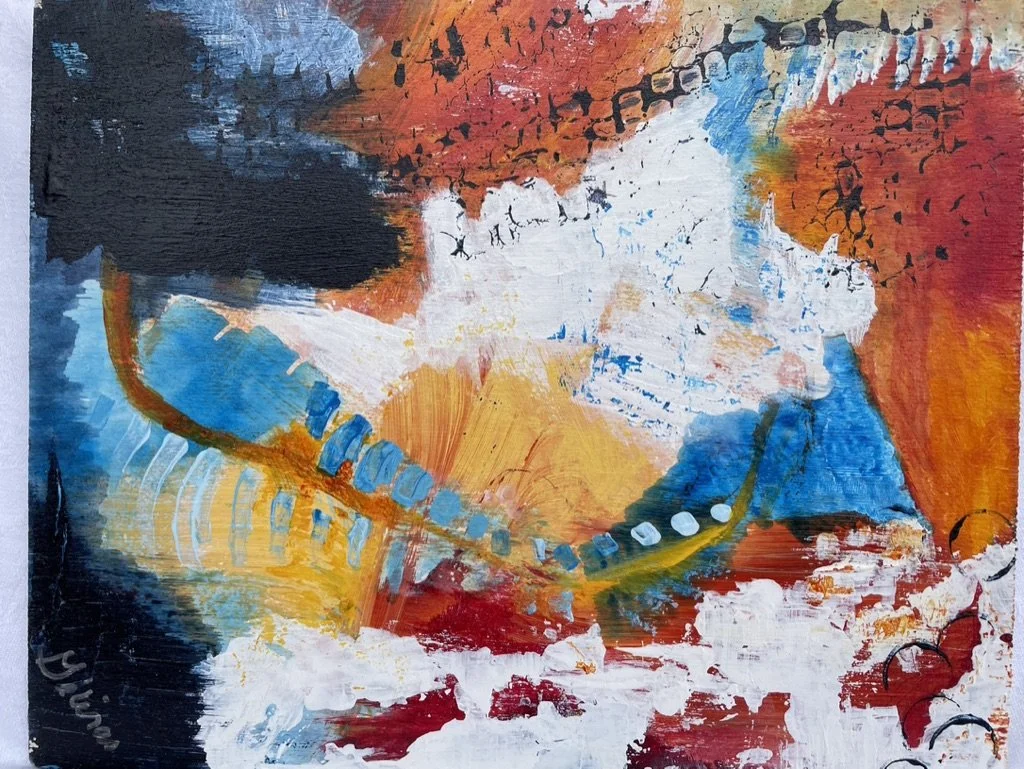Why I Write in English
Featherlight - Acrylic on Canvas Board, 8 x 10
My name is Marie José Gélinas.
I write in English.
“Why” is a legitimate question.
The answer to this question is rooted in the all-encompassing power of language over the experience we perceive as our life.
I grew up in a traditional French Canadian catholic family in the outskirts of Montréal. I learned English when I was five years old, out of necessity. My family had moved into a predominantly English-speaking neighbourhood, so I learned the language on the street with other children. We moved in February, and by June I was fluent in English. Excited at the prospect of winning a prize, I taught myself how to read the language on cereal boxes so I could enter the contests.
Yet, most of my life remained firmly rooted in my French speaking heritage. We left our suburban home to attend catholic church in the French-speaking village, I went to French school, and our family respected all the traditions of a French catholic family. There was a clear line between the two languages. The obvious one being the language of our home and the language of he neighbourhood. However, English became my language of expression due to an entirely different set of circumstances.
My childhood, you see, was overshadowed by a then little understood affliction: epilepsy. I was diagnosed very soon after I was born. Throughout my childhood, I experienced frequent and severe seizures. Living with epilepsy soon became the dominant theme of my family’s life. The impact on my quality of life went far beyond the side effects of the cocktails of drugs I took in an effort to control the seizures. For my family, epilepsy was a powerful force that rooted every decision concerning my welfare in fear. My terrified parents did everything to protect me from whatever source of harm they could imagine: falling off anything, hitting my head on anything, being out of their line of sight for any amount of time. Just think of any typical childhood game, and you will understand the impact such restrictions would have on a child. I could not develop friendships at school , so I was a stranger to my school mates. Besides, the seizures were terrifying for anyone who witnessed them, so other children were afraid of me. As a result of this I lived a very sheltered life, a very isolated and lonely childhood.
Relating all the ways epilepsy coloured my life is far too complex a topic for a blog post, but here, I can perhaps help you understand why I write in English.
In French, I was held close to my family, tethered to ancestors that came here centuries ago, bound by generations of traditions. In French, I was a sheltered child, but the protective walls built to keep me safe felt like a prison.
When I learned to speak English, I learned to use a tool that allowed me to tell my own story. Learning another language taught me that I could define my world, myself, otherwise. The sounds and the rhythms of the language became the scaffold for a different version of myself, one I could create. It became the first step in a lifelong fascination with language and the powers it conveyed.
As I grew, I became increasingly aware of the ways in which I was alienated from my peers. On the cusp of adolescence yet still contained by my family’s authority, I pulled at my restraints more and more. I needed an outlet for my conflicting emotions and growing need for freedom.
Within my family, every opinion had to be filtered through their fear. I dared not express how sad, lonely, or starved I felt given all my parents were doing to keep me safe. How could I complain to the doctors following my case, preforming tests and choosing the right medication, when my working class parents were dutifully ensuring my care in an age before medicare? How could I tell them that it was all not enough?
No, my frustrations were best poured out elsewhere.
When I was eleven years old, I picked up a pen and began my first ever journal - in English. Writing in a language other than the language of my painful existence gave me wings. I expressed myself in a way I could not in my native tongue. In my journal, in English, I could say what I couldn’t say out loud. I could process my experience through a different filter. Writing in English allowed me perspective.
Dear Vicky, I wrote. No one I knew, which made it even easier to be honest. Vicky became the confidant I didn’t have, and English became the language I could use honestly.

